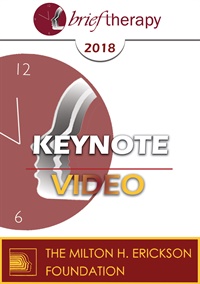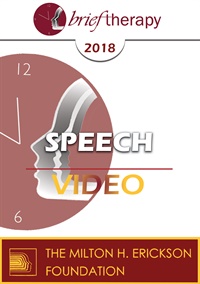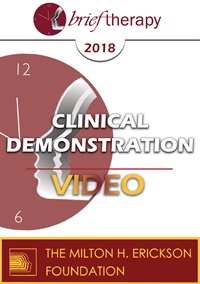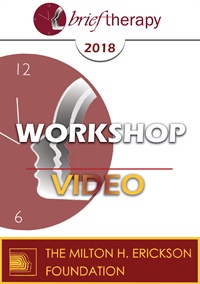
Credit available - Click Here for more information
- Average Rating:
- Not yet rated
- Topic Areas:
- Couples Therapy | Relationships | Continuing Education | Mindfulness | Topical Panels | Treatment Planning | IMAGO | Psychobiological Approach to Couples Therapy (PACT) | Family Systems
- Categories:
- Couples Conference | Couples Conference 2021 | Online Continuing Education | Pioneers in Couples and Family Therapy
- Faculty:
- Helen LaKelly Hunt, PhD | Caroline S. Welch | Stan Tatkin, PsyD, MFT | Shawn Giammattei, PhD
- Course Levels:
- Master Degree or Higher in Health-Related Field
- Duration:
- 58 Minutes
- Format:
- Audio and Video
- Original Program Date:
- Jun 06, 2021
- Short Description:
- This panel addresses managing reactivity in relationships, focusing on a neurodivergent, neurotypical, trans gay couple. Topics include touch sensitivity, parenting conflicts, and emotional regulation. Highlights include the use of narrative therapy, positive Intelligence, dialog practices, and brain-based techniques to strengthen empathy and resilience. Emphasis is placed on mindfulness, direct intervention, and supporting relationship dynamics shaped by neurodiversity.
- Price:
- $29.00 - Base Price

- Average Rating:
- Not yet rated
- Topic Areas:
- Utilization | Clinical Demonstrations | Psychotherapy | Therapist Development | Anxiety | Ericksonian Hypnosis and Therapy Techniques | Religion | Art of Psychotherapy
- Bundle(s):
- Art of Psychotherapy - Utilization Series
- Categories:
- Art of Psychotherapy
- Faculty:
- Jeffrey Zeig, PhD
- Course Levels:
- Master Degree or Higher in Health-Related Field
- Duration:
- 2 Hours 22 Minutes
- Format:
- Audio and Video
- Original Program Date:
- Jun 21, 2020
- Short Description:
- In our first session, our demonstration subject has recently made a major life change. They have decided to change their career from being a priest, into becoming a therapist. Big life changes like these often induce anxiety in patients, and in this clinical demonstration we see Dr. Jeffrey Zeig exhibit a number of Ericksonian techniques to help the client be in harmony with themselves. Dr. Zeig utilizes some of Ginny’s religious history to help guide her towards transformation.
- Price:
- $79.00 - Base Price
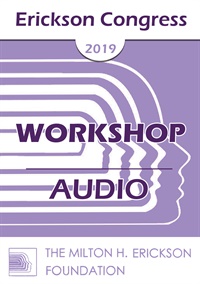
- Average Rating:
- Not yet rated
- Topic Areas:
- Workshops | Anxiety | Cognitive Behavior Therapy (CBT) | Hypnosis | Mindfulness | Worry
- Categories:
- Erickson Congress | Erickson Congress 2019
- Faculty:
- Carolyn Daitch, PhD
- Duration:
- 2 Hours 2 Minutes
- Format:
- Audio Only
- Original Program Date:
- Dec 15, 2019
- Short Description:
- Anxiety destroys the normal enjoyment of life through the fear, worry, obsessive thinking and avoidant behavior that anxious people experience. Simple activities like going to the grocery store, taking a child to her first day of school, or meeting a friend for lunch trigger a barrage of frantic “what ifs.” This demonstration will explore the subtleties of working with this pervasive category of disorders, and will introduce a powerful, integrative therapy model.
- Price:
- $15.00 - Base Price
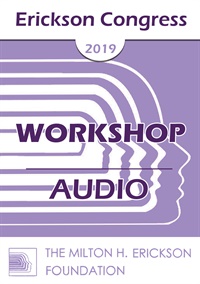
- Average Rating:
- Not yet rated
- Topic Areas:
- Workshops | Anxiety | Milton Erickson | Virginia Satir | Somatic Experiences | Hypnotherapy | Resources
- Categories:
- Erickson Congress | Erickson Congress 2019
- Faculty:
- Wei-Kai Hung, M.Ed., L.M.H.C., L.P.C. | Eva Wieprecht, MBA
- Duration:
- 1 Hour 58 Minutes
- Format:
- Audio Only
- Original Program Date:
- Dec 15, 2019
- Short Description:
- In this workshop, East and West blend, intertwine, and approach anxiety symptoms in a creative way. Eva from Germany, with her masterful practice in Satir somatic modeling, combined with Wei Kai from Taiwan, with his mindful practice in Tai Chi and Taoism hypnotherapy, will create a new model in treating anxiety. We both learned Ericksonian approach for years, and utilized various somatic movements to help self regulation, and increase self steering competencies in challenging times.
- Price:
- $15.00 - Base Price
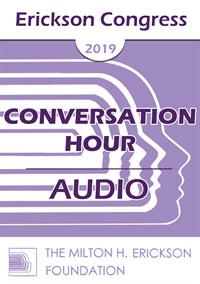
- Average Rating:
- Not yet rated
- Topic Areas:
- Conversation Hours | Anxiety | Children and Adolescent Therapy
- Categories:
- Erickson Congress | Erickson Congress 2019
- Faculty:
- Lynn Lyons, LICSW
- Duration:
- 1 Hour
- Format:
- Audio Only
- Original Program Date:
- Dec 14, 2019
- Short Description:
- Many clinicians focus on breathing, calming, or other distraction techniques when dealing with anxious children. However, focusing on "getting rid of the worry" often backfires, and leaves children and teens feeling more hopeless than engaged. But, when we use short "relaxation" practices with children to shift their patterns and beliefs--when we use this time of focus to deliver and seed valuable information--we create great opportunities for change, engagement, and skill-building. In this hour, I'll describe the tricks to getting the most out these exercises, without stepping into the trap of elimination.
- Price:
- $15.00 - Base Price
Tags: Adolescents Anxiety Children
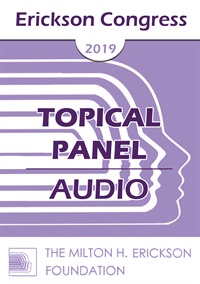
- Average Rating:
- Not yet rated
- Topic Areas:
- Topical Panels | Anxiety | Obsessive Compulsive Disorder (OCD)
- Categories:
- Erickson Congress | Erickson Congress 2019
- Faculty:
- Carolyn Daitch, PhD | Joseph Dowling, MS, LPC | Gary Ruelas, DO, PhD | Reid Wilson, PhD
- Duration:
- 59 Minutes
- Format:
- Audio Only
- Original Program Date:
- Dec 13, 2019
- Short Description:
- Anxiety disorders are among the most common reasons that patients seek therapy. Hypnotic processes have been empirically validated to treat anxiety disorders including obsessive-compulsive illness.
- Price:
- $15.00 - Base Price
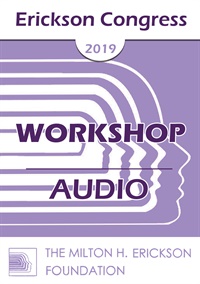
- Average Rating:
- Not yet rated
- Topic Areas:
- Workshops | Anxiety | Family Therapy | Homework | Children and Adolescent Therapy | Experiential Therapy
- Categories:
- Erickson Congress | Erickson Congress 2019
- Faculty:
- Lynn Lyons, LICSW
- Duration:
- 1 Hour 56 Minutes
- Format:
- Audio Only
- Original Program Date:
- Dec 13, 2019
- Short Description:
- After decades of working with anxious children and teens, I have two unshakable truths: families MUST be involved in treatment and anxious patterns are shifted through experiential learning. Working with the FOUR critical concepts to manage anxiety in families and the SIX patterns that must be interrupted, this workshop will describe HOW to create active, engaging assignments for families to do between sessions and describe the TEN favorites that I return to again and again.
- Price:
- $15.00 - Base Price
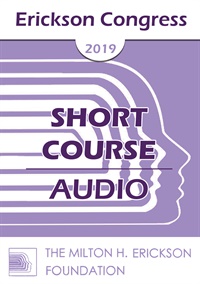
- Average Rating:
- Not yet rated
- Topic Areas:
- Short Courses | Anxiety | Depression | Ericksonian Hypnosis and Therapy Techniques | Children and Adolescent Therapy | Eye Movement Desensitization and Reprocessing (EMDR) | Hypnosis | Cognitive Behavior Therapy (CBT)
- Categories:
- Erickson Congress | Erickson Congress 2019
- Faculty:
- Joseph Sestito, MSSA, LISW-S
- Duration:
- 1 Hour 33 Minutes
- Format:
- Audio Only
- Original Program Date:
- Dec 12, 2019
- Short Description:
- The first factor that is of central importance is developing a strong therapeutic alliance with the client, mainly through empathically relating to him/her. Second, it will be shown how to guide adolescents and younger children to identify the specific Activating Event (AE) that is bringing about their unhealthy negative emotions through triggering self-defeating cognition(s).
- Price:
- $15.00 - Base Price
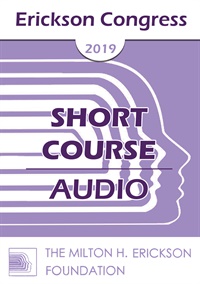
- Average Rating:
- Not yet rated
- Topic Areas:
- Short Courses | Anxiety | Communication | Depression | Neurobiology
- Categories:
- Erickson Congress | Erickson Congress 2019
- Faculty:
- Bart Walsh, MSW
- Duration:
- 1 Hour 29 Minutes
- Format:
- Audio Only
- Original Program Date:
- Dec 12, 2019
- Short Description:
- Chronic anxiety and depression present significant challenges for those affected by these conditions. A behavioral treatment which accesses deep levels of mind-body functioning facilitates remission of these debilitating conditions. This treatment, conceptualized as essential neurobiological communication (ENBC), incorporates a form of body language known as ideomotor signaling.
- Price:
- $15.00 - Base Price
Tags: Anxiety Depression Neurobiology
Credit available - Click Here for more information
- Average Rating:
- Not yet rated
- Topic Areas:
- Keynotes | Anxiety | Brief Therapy | Cognitive Behavior Therapy (CBT) | Depression
- Categories:
- Brief Therapy Conference | Brief Therapy Conference 2018 | Online Continuing Education
- Faculty:
- David Burns, MD
- Course Levels:
- Master Degree or Higher in Health-Related Field
- Duration:
- 1:00:36
- Format:
- Audio and Video
- Original Program Date:
- Dec 09, 2018
- Short Description:
- Dr. Burns will describe powerful new TEAM-CBT techniques that can greatly accelerate recovery from depression and anxiety disorders. He will bring these tools with life with dramatic video excerpts from a therapy session with a mental health professional who had been struggling with years of intense anxiety, depression, and guilt.
- Price:
-
Sale is $29.00
price reduced from Base Price - $59.00
Credit available - Click Here for more information
- Average Rating:
- Not yet rated
- Topic Areas:
- Speeches | Children and Adolescent Therapy | Art and Creativity | Brief Therapy | Family Therapy | Anxiety | Depression | Goals of the Therapist
- Categories:
- Brief Therapy Conference | Brief Therapy Conference 2018 | Online Continuing Education
- Faculty:
- Lynn Lyons, LICSW
- Course Levels:
- Master Degree or Higher in Health-Related Field
- Duration:
- 1:02:45
- Format:
- Audio and Video
- Original Program Date:
- Dec 09, 2018
- Short Description:
- We don't often think of creativity and problem solving as equal partners in therapy with children. But when struggling families arrive at your office, it is the immediate blending of these two components that allows you and the family to move quickly from overwhelmed to engaged, confused to targeted. Based on 29 years of successes and failures, this speech will offer ideas to immediately connect with families, help them untangle the tired messiness they often arrive with, and create active interventions that build momentum, create new patterns, and offer hope.
- Price:
-
Sale is $29.00
price reduced from Base Price - $59.00
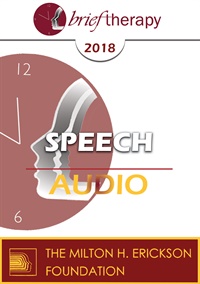
- Average Rating:
- Not yet rated
- Topic Areas:
- Speeches | Brief Therapy | Trauma | Anxiety | Hypnosis | Pain and Healing | Dissociation
- Categories:
- Brief Therapy Conference | Brief Therapy Conference 2018
- Faculty:
- Camillo Loriedo, MD, PhD
- Duration:
- 1:00:42
- Format:
- Audio Only
- Original Program Date:
- Dec 09, 2018
- Short Description:
- Dissociative hypnotic intervention demonstrated to be very useful in treating pain, anxiety disorders and many other conditions. But hypnosis can as well reactivate the natural mind processes, contributing to reconnect different parts (distinct modes of information processing) into a functional and unified self, particularly after traumatic experiences. Rapport, the special relationship that produces intense interpersonal links and connections, as well as profound disconnections with non-hypnotic reality, can be considered a crucial factor of brief therapeutic approach to dissociative conditions and trauma. How to use rapport as well as other new specific therapeutic interventions to reestablish the natural integrative links in a dissociative mind and relationship will be outlined in this presentation.
- Price:
- $15.00 - Base Price
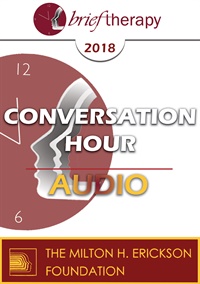
- Average Rating:
- Not yet rated
- Topic Areas:
- Great Conversations | Anxiety | Brief Therapy
- Categories:
- Brief Therapy Conference | Brief Therapy Conference 2018
- Faculty:
- Bill O'Hanlon, MS | Reid Wilson, PhD
- Duration:
- 1:01:40
- Format:
- Audio Only
- Original Program Date:
- Dec 08, 2018
- Short Description:
- Compare and contrast complementary perspectives on the theory and practice of working with anxiety disorders.
- Price:
- $15.00 - Base Price
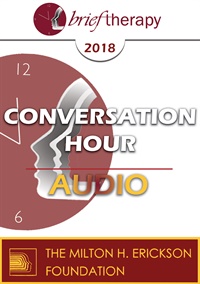
- Average Rating:
- Not yet rated
- Topic Areas:
- Great Conversations | Anxiety | Depression | Research | Training | Brief Therapy
- Categories:
- Brief Therapy Conference | Brief Therapy Conference 2018
- Faculty:
- Stephen Gilligan, PhD | Scott Miller, PhD
- Duration:
- 1:05:12
- Format:
- Audio Only
- Original Program Date:
- Dec 08, 2018
- Short Description:
- Therapists need theoretical and technical constructs, including those that are empirically based. Therapists need to understand how to create a comprehensive treatment plan.
- Price:
- $15.00 - Base Price
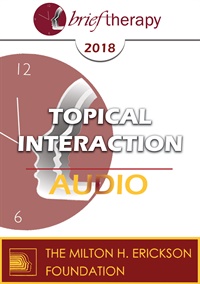
- Average Rating:
- Not yet rated
- Topic Areas:
- Topical Interactions | Anxiety | Brief Therapy | Children and Adolescent Therapy | Community | Depression
- Categories:
- Brief Therapy Conference | Brief Therapy Conference 2018
- Faculty:
- Lynn Lyons, LICSW
- Duration:
- 1:03:32
- Format:
- Audio Only
- Original Program Date:
- Dec 08, 2018
- Short Description:
- Educators are being asked to do more and more to support the emotional wellbeing of students and understand the mental health needs of their students. Programs are consistently being introduced and professional development offered. What's working and what isn't? How much can we expect of teachers and administrators? How is the collaboration and communication between parents, schools, and outside providers going? And what are students actually earning in about their mental health in school?
- Price:
- $15.00 - Base Price
Credit available - Click Here for more information
- Average Rating:
- Not yet rated
- Topic Areas:
- Clinical Demonstrations | Anxiety | Hypnosis | Brief Therapy | Language of Hypnosis
- Bundle(s):
- Learning Track - Using Hypnosis
- Categories:
- Brief Therapy Conference | Brief Therapy Conference 2018 | Online Continuing Education
- Faculty:
- Lynn Lyons, LICSW
- Course Levels:
- Master Degree or Higher in Health-Related Field
- Duration:
- 58:59
- Format:
- Audio and Video
- Original Program Date:
- Dec 08, 2018
- Short Description:
- Using hypnosis to help anxious people relax and feel calm is a great start, but hypnosis offers other valuable opportunities to disrupt the patterns of anxiety, create a different relationship to thoughts and physical symptoms , and to shift the client from avoidance into action.
- Price:
-
Sale is $29.00
price reduced from Base Price - $59.00
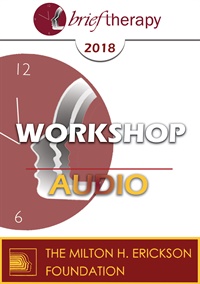
- Average Rating:
- Not yet rated
- Topic Areas:
- Workshops | Anxiety | Therapeutic Relationship | Therapist Development
- Categories:
- Brief Therapy Conference | Brief Therapy Conference 2018
- Faculty:
- Reid Wilson, PhD
- Duration:
- 2:01:25
- Format:
- Audio Only
- Original Program Date:
- Dec 07, 2018
- Short Description:
- A client's willingness to embrace doubt and discomfort while feeling afraid requires them to elevate above their immediate fear and apply a new response based on a new and provocative therapeutic frame of reference. This workshop will present how to persuade clients to engage in such a therapeutic protocol to respond to an anxious moment in a manner that promotes healing. Participants will learn how to present four concepts to justify this approach. You can learn to approach instead of withdraw during a threatening moment by activating a competing emotion that expresses a competing point of view.
- Price:
- $15.00 - Base Price
Credit available - Click Here for more information
- Average Rating:
- Not yet rated
- Topic Areas:
- Workshops | Brief Therapy | Cognitive Behavior Therapy (CBT) | Therapist Development | Anxiety | Depression | Resistance
- Categories:
- Brief Therapy Conference | Brief Therapy Conference 2018 | Online Continuing Education
- Faculty:
- David Burns, MD | Jill Levitt, PhD
- Course Levels:
- Master Degree or Higher in Health-Related Field
- Duration:
- 2:00:37
- Format:
- Audio and Video
- Original Program Date:
- Dec 07, 2018
- Short Description:
- Dr. David Burns and his colleague, Dr. Jill Levitt, will do live therapy with an audience volunteer who’s been struggling with depression and anxiety. They will give you the unique opportunity to go behind closed doors to see how TEAM-CBT actually works in real time. When you witness the rapid transformation of intense self -doubt into joy, relief, and enlightenment, you will feel much better about yourself, while at the same time learning some awesome new tools that you can use right away to improve your clinical outcomes. This promises to be an exciting, educational and inspirational experience!
- Price:
-
Sale is $29.00
price reduced from Base Price - $59.00
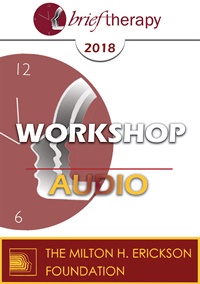
- Average Rating:
- Not yet rated
- Topic Areas:
- Workshops | Anxiety | Brief Therapy | Children and Adolescent Therapy | Depression | Family Therapy
- Categories:
- Brief Therapy Conference | Brief Therapy Conference 2018
- Faculty:
- Lynn Lyons, LICSW
- Duration:
- 2:00:14
- Format:
- Audio Only
- Original Program Date:
- Dec 07, 2018
- Short Description:
- The most frequent complaint I hear from parents about the treatment they receive for their child's anxiety? "No one told us what to DO!" Anxiety is often generational, and by the time a family arrives at your office, they have been in the grips of the cult leader called anxiety for years. Worse yet, many of the things they have been doing, although loving and supportive, are actually making the anxiety stronger. This workshop will describe how to give families immediate and active solutions from the first session, including the use of front loading to provide critical information and understanding, changing the family's relationship with anxiety, and creating active interventions that are often the opposite of what they've typically been doing.
- Price:
- $15.00 - Base Price
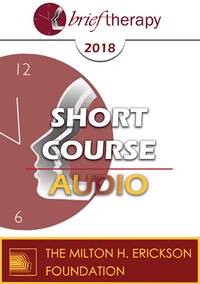
- Average Rating:
- Not yet rated
- Topic Areas:
- Short Courses | Anxiety | Depression | Self-Hypnosis | Somatic Experiences | Burnout | Psychosomatics | Self-Esteem | Stress
- Categories:
- Brief Therapy Conference | Brief Therapy Conference 2018
- Faculty:
- Paul Koeck, MD
- Duration:
- 1:33:40
- Format:
- Audio Only
- Original Program Date:
- Dec 06, 2018
- Short Description:
- This is a workshop with live Hypnotic Scaling clinical demonstration and practical exercises. Hypnotic Scaling is a simple Ericksonian & Solution Focused self-hypnotic technique to help your client self-control and resolve any Stress, Anxiety, Depression or other negative emotions.
- Price:
- $15.00 - Base Price
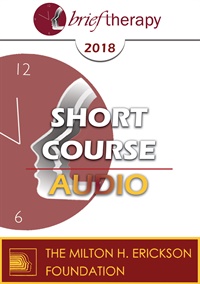
- Average Rating:
- Not yet rated
- Topic Areas:
- Short Courses | Anxiety | Brief Therapy | Utilization | Ericksonian Hypnosis and Therapy Techniques | Experiential Therapy
- Categories:
- Brief Therapy Conference | Brief Therapy Conference 2018
- Faculty:
- Wei-Kai Hung, M.Ed., L.M.H.C., L.P.C.
- Duration:
- 1:25:01
- Format:
- Audio Only
- Original Program Date:
- Dec 06, 2018
- Short Description:
- Alchemy is about transformation process (Linear). Taoism is about going with flow (Circular). Ericksonian is about utilization and experiential therapy (Infinite Possibilities). This experiential workshop will utilize the best of eastern and western philosophical concepts to treat anxiety effectively and efficiently.
- Price:
- $15.00 - Base Price
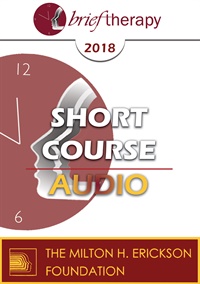
- Average Rating:
- Not yet rated
- Topic Areas:
- Short Courses | Anxiety | Brief Therapy | Family Therapy
- Categories:
- Brief Therapy Conference | Brief Therapy Conference 2018
- Faculty:
- Dhara Meghani, PhD | Paulina Barahona, MS
- Duration:
- 1:25:43
- Format:
- Audio Only
- Original Program Date:
- Dec 06, 2018
- Short Description:
- Parentline is a telehealth service developed by psychologists at University of San Francisco for families with children birth to three. Presenters will detail this protocol and its integration with the delivery of focused, skill-based interventions, which research indicates is especially supportive for new parents. Pilot study results of the protocol, which is hypothesized to increase parenting confidence, decrease anxiety and depressive symptoms, and improve perceptions of support in the first six months postpartum, will be shared.
- Price:
- $15.00 - Base Price
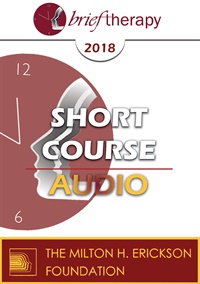
- Average Rating:
- Not yet rated
- Topic Areas:
- Short Courses | Psychotherapy | Awareness Integration Model | Brief Therapy | Anxiety | Depression
- Categories:
- Brief Therapy Conference | Brief Therapy Conference 2018
- Faculty:
- Foojan Zeine, Psy.D., MFT
- Duration:
- 1:16:41
- Format:
- Audio Only
- Original Program Date:
- Dec 06, 2018
- Short Description:
- The clinical method of the Awareness Integration model has evolved from Cognitive, emotional, Behavioral, body-oriented, and trauma releasing theories and has been researched with a diverse population with significant results toward minimizing Depression and Anxiety.
- Price:
- $15.00 - Base Price
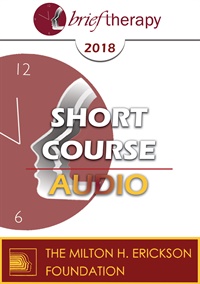
- Average Rating:
- Not yet rated
- Topic Areas:
- Short Courses | Anxiety | Communication | Depression | Neurobiology | Brief Therapy
- Categories:
- Brief Therapy Conference | Brief Therapy Conference 2018
- Faculty:
- Bart Walsh, MSW
- Duration:
- 1:29:10
- Format:
- Audio Only
- Original Program Date:
- Dec 06, 2018
- Short Description:
- Chronic anxiety and depression present significant challenges for those affected by these conditions. A behavioral treatment which accesses deep levels of mindbody functioning facilitates remission of these debilitating conditions. This treatment, conceptualized as essential neurobiological communication (ENBC), incorporates a form of body language known as ideomotor signaling. Because these are chronic conditions, the affected individual learns how to fully manage these states on their own. Also presented is a noninvasive, structured protocol for reducing the adverse influence of unresolved emotion on present experience. Essential to this model is a progressive ratification sequence intended to ground emotional adjustments in thought, perception and behavior. This brief procedure is a useful adjunct to other treatment modalities and instrumental
- Price:
- $15.00 - Base Price
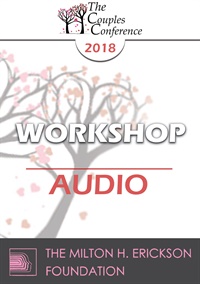
- Average Rating:
- Not yet rated
- Topic Areas:
- Workshops | Anxiety | Couples Therapy | IMAGO | Conflict | Gender
- Categories:
- Couples Conference | Couples Conference 2018 | Pioneers in Couples and Family Therapy
- Faculty:
- Harville Hendrix, PhD | Helen LaKelly Hunt, PhD
- Duration:
- 1:47:37
- Format:
- Audio Only
- Original Program Date:
- May 04, 2018
- Short Description:
- This workshop focuses on building safety and connection in relationships using Imago therapy. Participants practice mirroring, validation, and sharing childhood experiences to better understand unmet needs. Key concepts include emotional symbiosis, the “space between” partners, and the dynamic between “hailstorm” and “turtle” personalities. Emphasis is placed on empathy, mutual healing, and the impact of early experiences on adult relationships.
- Price:
- $15.00 - Base Price


